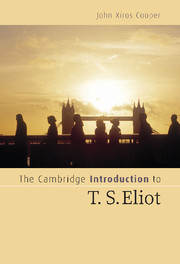57 results
10 - T. S. Eliot's Social Criticism
-
-
- Book:
- The New Cambridge Companion to T. S. Eliot
- Published online:
- 01 December 2016
- Print publication:
- 14 November 2016, pp 145-161
-
- Chapter
- Export citation
10 - T. S. Eliot's Social Criticism
-
-
- Book:
- The New Cambridge Companion to T. S. Eliot
- Published online:
- 01 December 2016
- Print publication:
- 14 November 2016, pp 145-161
-
- Chapter
- Export citation
18 - T. S. Eliot and American Poetry
-
-
- Book:
- The Cambridge Companion to American Poets
- Published online:
- 05 November 2015
- Print publication:
- 14 October 2015, pp 245-257
-
- Chapter
- Export citation
Contributors
-
-
- Book:
- Robert Frost in Context
- Published online:
- 05 April 2014
- Print publication:
- 14 April 2014, pp ix-xvi
-
- Chapter
- Export citation
Chapter 8 - Robert Frost and Modernism
- from Part II - Literary–Historical Contexts
-
-
- Book:
- Robert Frost in Context
- Published online:
- 05 April 2014
- Print publication:
- 14 April 2014, pp 85-91
-
- Chapter
- Export citation
28 - Anti-Semitism
-
-
- Book:
- T. S. Eliot in Context
- Published online:
- 05 August 2012
- Print publication:
- 31 March 2011, pp 285-294
-
- Chapter
- Export citation
40 - Pound before Pisa: 1920–1945
-
-
- Book:
- Ezra Pound in Context
- Published online:
- 05 July 2014
- Print publication:
- 11 November 2010, pp 447-456
-
- Chapter
- Export citation
Notes
-
- Book:
- The Cambridge Introduction to T. S. Eliot
- Published online:
- 05 June 2012
- Print publication:
- 14 September 2006, pp 117-119
-
- Chapter
- Export citation
Preface
-
- Book:
- The Cambridge Introduction to T. S. Eliot
- Published online:
- 05 June 2012
- Print publication:
- 14 September 2006, pp ix-x
-
- Chapter
- Export citation
Chapter 3 - Works
-
- Book:
- The Cambridge Introduction to T. S. Eliot
- Published online:
- 05 June 2012
- Print publication:
- 14 September 2006, pp 37-108
-
- Chapter
- Export citation
Chapter 2 - Contexts
-
- Book:
- The Cambridge Introduction to T. S. Eliot
- Published online:
- 05 June 2012
- Print publication:
- 14 September 2006, pp 22-36
-
- Chapter
- Export citation
Chapter 1 - Life
-
- Book:
- The Cambridge Introduction to T. S. Eliot
- Published online:
- 05 June 2012
- Print publication:
- 14 September 2006, pp 1-21
-
- Chapter
- Export citation

The Cambridge Introduction to T. S. Eliot
-
- Published online:
- 05 June 2012
- Print publication:
- 14 September 2006
Index
-
- Book:
- The Cambridge Introduction to T. S. Eliot
- Published online:
- 05 June 2012
- Print publication:
- 14 September 2006, pp 124-129
-
- Chapter
- Export citation
Contents
-
- Book:
- The Cambridge Introduction to T. S. Eliot
- Published online:
- 05 June 2012
- Print publication:
- 14 September 2006, pp vii-viii
-
- Chapter
- Export citation
Frontmatter
-
- Book:
- The Cambridge Introduction to T. S. Eliot
- Published online:
- 05 June 2012
- Print publication:
- 14 September 2006, pp i-vi
-
- Chapter
- Export citation
The works of T. S. Eliot
-
- Book:
- The Cambridge Introduction to T. S. Eliot
- Published online:
- 05 June 2012
- Print publication:
- 14 September 2006, pp 120-120
-
- Chapter
- Export citation
Chapter 4 - Critical reception
-
- Book:
- The Cambridge Introduction to T. S. Eliot
- Published online:
- 05 June 2012
- Print publication:
- 14 September 2006, pp 109-116
-
- Chapter
- Export citation
Abbreviations
-
- Book:
- The Cambridge Introduction to T. S. Eliot
- Published online:
- 05 June 2012
- Print publication:
- 14 September 2006, pp xi-xii
-
- Chapter
- Export citation
Further reading
-
- Book:
- The Cambridge Introduction to T. S. Eliot
- Published online:
- 05 June 2012
- Print publication:
- 14 September 2006, pp 121-123
-
- Chapter
- Export citation

